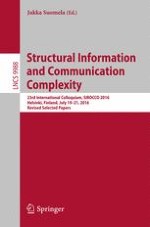2016 | OriginalPaper | Buchkapitel
Asynchronous Broadcasting with Bivalent Beeps
verfasst von : Kokouvi Hounkanli, Andrzej Pelc
Erschienen in: Structural Information and Communication Complexity
Aktivieren Sie unsere intelligente Suche, um passende Fachinhalte oder Patente zu finden.
Wählen Sie Textabschnitte aus um mit Künstlicher Intelligenz passenden Patente zu finden. powered by
Markieren Sie Textabschnitte, um KI-gestützt weitere passende Inhalte zu finden. powered by
